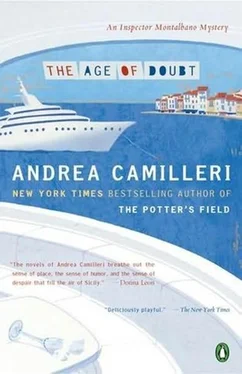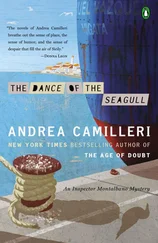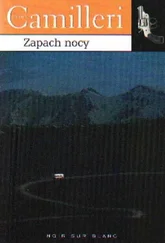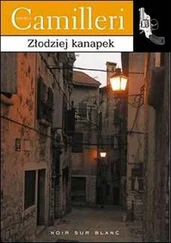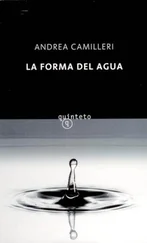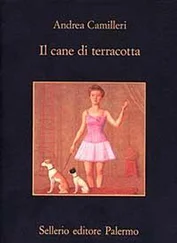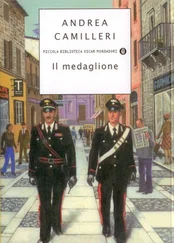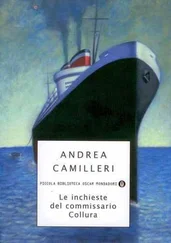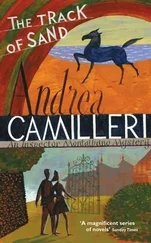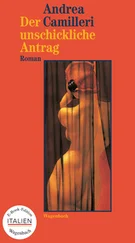How, when they met in front of others, would they manage to hide what they felt?
Should he take every measure to avoid seeing her? He could do this, but it would mean abandoning the investigation. That was too high a price. He didn’t feel like paying it.
***
It was about nine in the morning, and Montalbano had already been in his office for half an hour or so when the telephone rang.
He was in a dark mood and didn’t feel like doing anything. He was staring at the damp stains on the ceiling, trying to make out faces and animal shapes, but that morning his imagination had abandoned him, and the stains remained stains.
“Ahh Chief! Iss a man says ’is name’s Fiorentino.”
How was it that Catarella had finally got someone’s name right?
“Did he say what he wanted?”
“Yessir. ’E wants a talk t’yiz poissonally in poisson.”
“Put him through.”
“I can’t put ’im true in so how as ’e’s on-”
“The premises?”
“Yessir.”
“Show him in.”
Five minutes went by and nobody appeared. He called Catarella.
“Well? Where’s this Fiorentino?”
“I showed ’im in.”
“But he’s not here!”
“He coun’t be there, Chief, in so much as, juss like you said, I showed ’im into the waitin’ room.”
“Bring him to me!”
“Straitaways, Chief.”
A short little man of about fifty, well dressed and wearing glasses, came in.
“Please sit down, Signor Fiorentino.”
The man gave him a confused look.
“I beg your pardon, but my name is Toscano.”
Catarella’s mangling of people’s surnames was getting more and more sophisticated.
“I’m sorry. Please sit down and tell me what I can do for you.”
“I’m the owner of the Bellavista Hotel.”
Montalbano knew the place. It had been recently built just outside of town, on the Montereale road.
“A few days ago a guest arrived, saying he was going to stay for a day and a night. He went up to his room, then came back down to the lobby, had us call a cab for him, and then left, and we haven’t seen him since.”
“Was it you who registered him?”
“No, I drop by the hotel only once a day. My primary business is furniture. Late last night, as I was going to bed, I got a call from the night porter, who had just seen the appeal from the Free Channel for information about an unknown man who had been found dead. In his opinion, the description they gave fit our missing client, so I decided to come and tell you.”
“Thank you very much, Signor Toscano. So presumably all the information on this man is at the hotel desk?”
“Of course.”
“Would you like to go there with me?”
“I’m at your service. I told the night porter to wait at the desk for that very purpose.”
***
The document the guest had left with the porter and never picked up was not, however, much help at all. It was a European Union passport issued by the French Republic two years earlier, and it said that its bearer was Émile Lannec, born in Rouen on September 3, 1965. The tiny photograph showed the nondescript face of a sandy-haired man of about forty with broad shoulders. Montalbano felt as if he’d heard that name before. But when? On what occasion? He tried hard to remember, but couldn’t come up with anything.
The passport’s only peculiarity lay in the fact that there wasn’t a single page that wasn’t covered with stamps and entry and exit visas for various Middle Eastern and African nations. The man had certainly traveled a lot in two years! He whirled about more than a spinning top!
Émile Lannec. The inspector couldn’t get the name out of his head. Then, all at once, he associated it with the sea. Lannec had something to do with the sea.
Want to bet he’d met him the time Livia had wanted to go to Saint-Tropez and he kept wanting to shoot himself in the head for living inside a cliché?
“I’m going to take this with me,” he said, putting the passport in his pocket.
Gaetano Scimè, the sharp, fortyish night porter, was, on the other hand, a tremendous help.
“Was it you who signed the guest in?”
“Yessir.”
“What shift do you work?”
“From ten at night to seven in the morning.”
“And at what time did this gentleman arrive?”
“It must have been around nine-thirty in the morning.”
“Why were you still on the job?”
Scimè threw his hands up.
“By chance. That day my coworker, who’s also a friend, had to take his wife to the hospital and asked me to fill in for him until noon. Every so often we do these kinds of favors for each other.”
“What did this man look like?”
“Just like they said on TV. I got a good long look at him when he came down to-”
“Let’s proceed in orderly fashion, please. How did he seem the first time you saw him?”
The porter gave him a bewildered look.
“What do you mean?”
“Was he nervous, worried…?”
“He seemed perfectly normal to me.”
“How did he get here?”
“By cab, I think.”
“What do you mean by ‘I think’?”
“I mean that from here you can’t see the drop-off area and so I wasn’t able to see the taxi. But when the man came in, he still had his wallet in his hands, as if he had just paid his fare, and right after that, I heard a car leaving.”
“Where do you think he was coming from?”
The porter didn’t hesitate.
“From Punta Raisi, the airport.”
And he anticipated the inspector’s next question.
“The morning flight from Rome lands in Palermo at seven. And, in fact, three customers from Rome arrived about half an hour after he did. Apparently the Frenchman left the airport a little before the others.”
“What makes you say that?”
“Well, the man was carrying only a sort of overnight bag, whereas the others had suitcases and therefore had to wait for them at the luggage belt.”
“Go on.”
“Anyway, the guy stayed in his room for about an hour, then came back down.”
“Did he make any phone calls?”
“Not through our switchboard, no.”
“But can one call from the rooms without passing through the switchboard?”
“Of course. But in that case, a charge for the call would show up on the client’s account, whereas there was no charge for that room.”
“Do you know if he had a cell phone?”
“I couldn’t say.”
“Go on.”
“So the man came down and asked me to call him a cab. Since we’re a bit out of the way, the taxi took about twenty minutes to get here.”
“And what did he do during that time?”
“He sat down and started thumbing through a magazine. He was…”
The porter paused.
“No, never mind,” he said. “Excuse me.”
“No, you’re not excused. Finish your sentence.”
“When the guy came downstairs, he seemed to be in a different mood.”
“In what way?”
“Oh, I dunno… More cheerful. He was humming.”
“As if he’d received some good news?”
“Something like that.”
“You should be a policeman.”
“Thanks.”
“Did he speak Italian?”
“He managed. Then the cab arrived and he left.”
“And since then you haven’t heard from him at any time.”
“No, he hasn’t called.”
“Had he reserved his room in advance?”
“No.”
“How do you think he knew about this hotel?”
“We advertise a lot,” the manager interjected. “Even abroad.”
“And have there been any phone calls for this man during this time?”
“None.”
“Do you think he’s ever been a guest before at this hotel?”
Читать дальше
